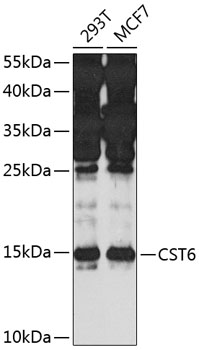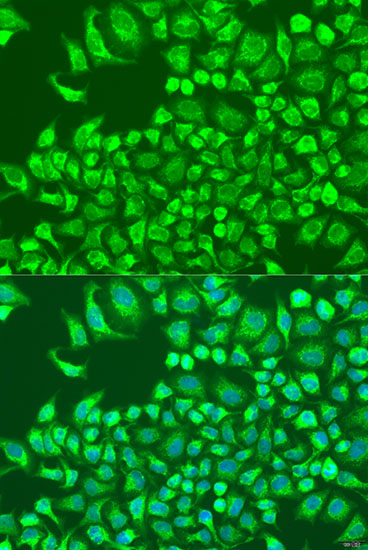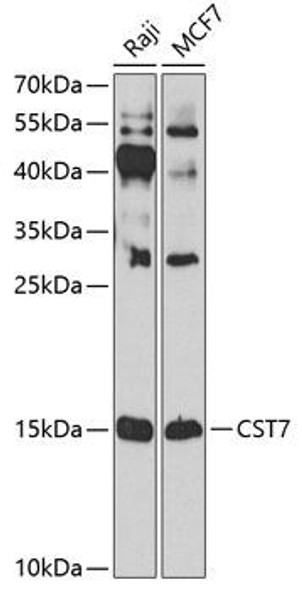Cell Biology Antibodies 11
Anti-Cystatin-M Antibody (CAB8115)
- SKU:
- CAB8115
- Product Type:
- Antibody
- Applications:
- WB
- Applications:
- IF
- Reactivity:
- Human
- Host Species:
- Rabbit
- Isotype:
- IgG
- Research Area:
- Cell Biology
Description
| Antibody Name: | CST6 Rabbit Polyclonal Antibody |
| Antibody SKU: | CAB8115 |
| Antibody Size: | 20uL, 50uL, 100uL |
| Application: | WB IF |
| Reactivity: | Human |
| Host Species: | Rabbit |
| Immunogen: | Recombinant fusion protein containing a sequence corresponding to amino acids 29-149 of human CST6 (NP_001314.1). |
| Application: | WB IF |
| Recommended Dilution: | WB 1:500 - 1:2000 IF 1:50 - 1:200 |
| Reactivity: | Human |
| Positive Samples: | 293T, MCF7 |
| Immunogen: | Recombinant fusion protein containing a sequence corresponding to amino acids 29-149 of human CST6 (NP_001314.1). |
| Purification Method: | Affinity purification |
| Storage Buffer: | Store at -20'C. Avoid freeze / thaw cycles. Buffer: PBS with 0.02% sodium azide, 50% glycerol, pH7.3. |
| Isotype: | IgG |
| Sequence: | RPQE RMVG ELRD LSPD DPQV QKAA QAAV ASYN MGSN SIYY FRDT HIIK AQSQ LVAG IKYF LTME MGST DCRK TRVT GDHV DLTT CPLA AGAQ QEKL RCDF EVLV VPWQ NSSQ LLKH NCVQ M |
| Gene ID: | 1474 |
| Uniprot: | Q15828 |
| Cellular Location: | Secreted |
| Calculated MW: | 16kDa |
| Observed MW: | 15kDa |
| Synonyms: | CST6 |
| Background: | The cystatin superfamily encompasses proteins that contain multiple cystatin-like sequences. Some of the members are active cysteine protease inhibitors, while others have lost or perhaps never acquired this inhibitory activity. There are three inhibitory families in the superfamily, including the type 1 cystatins (stefins), type 2 cystatins and the kininogens. The type 2 cystatin proteins are a class of cysteine proteinase inhibitors found in a variety of human fluids and secretions, where they appear to provide protective functions. This gene encodes a cystatin from the type 2 family, which is down-regulated in metastatic breast tumor cells as compared to primary tumor cells. Loss of expression is likely associated with the progression of a primary tumor to a metastatic phenotype. |
| UniProt Protein Function: | CST6: Shows moderate inhibition of cathepsin B but is not active against cathepsin C. Belongs to the cystatin family. |
| UniProt Protein Details: | Protein type:Secreted; Motility/polarity/chemotaxis; Secreted, signal peptide Chromosomal Location of Human Ortholog: 11q13 Cellular Component: cornified envelope Molecular Function:cysteine protease inhibitor activity Biological Process: epidermis development; anatomical structure morphogenesis |
| NCBI Summary: | The cystatin superfamily encompasses proteins that contain multiple cystatin-like sequences. Some of the members are active cysteine protease inhibitors, while others have lost or perhaps never acquired this inhibitory activity. There are three inhibitory families in the superfamily, including the type 1 cystatins (stefins), type 2 cystatins and the kininogens. The type 2 cystatin proteins are a class of cysteine proteinase inhibitors found in a variety of human fluids and secretions, where they appear to provide protective functions. This gene encodes a cystatin from the type 2 family, which is down-regulated in metastatic breast tumor cells as compared to primary tumor cells. Loss of expression is likely associated with the progression of a primary tumor to a metastatic phenotype. [provided by RefSeq, Jul 2008] |
| UniProt Code: | Q15828 |
| NCBI GenInfo Identifier: | 4503113 |
| NCBI Gene ID: | 1474 |
| NCBI Accession: | NP_001314.1 |
| UniProt Secondary Accession: | Q15828,Q540N7, |
| UniProt Related Accession: | Q15828 |
| Molecular Weight: | 16,511 Da |
| NCBI Full Name: | cystatin-M |
| NCBI Synonym Full Names: | cystatin E/M |
| NCBI Official Symbol: | CST6 |
| NCBI Protein Information: | cystatin-M; cystatin 6; cystatin M; cystatin-6; cystatin-E; cystatin M/E; cysteine proteinase inhibitor |
| UniProt Protein Name: | Cystatin-M |
| UniProt Synonym Protein Names: | Cystatin-6; Cystatin-E |
| Protein Family: | Cystatin |
| UniProt Gene Name: | CST6 |
| UniProt Entry Name: | CYTM_HUMAN |
View AllClose








